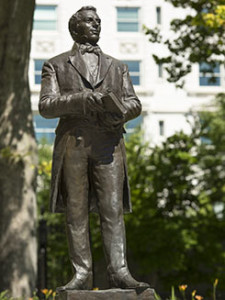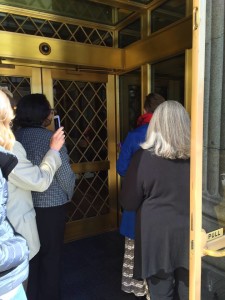 Joseph Smith was an accessible prophet by most accounts. The Saints called him Brother Joseph, and he invited them into his home and his life and his family (I know there is a polygamy joke to be made here, but let’s set that aside). Our church’s early history is full of stories about the people he and Emma sheltered, counseled, and cared for. No evidence is more compelling, in my mind, than the Doctrine and Covenants. This sacred text is full of revelations that Joseph Smith received at the request of members of the church. The section headings in the Doctrine and Covenants tell us that Brother Joseph commonly went to the Lord with questions from men like Martin Harris, Oliver Cowdery, Joseph Knight, the Whitmer brothers, and many others. He even went to the Lord on behalf of William E. McLellin when McLellin wouldn’t tell him what his questions actually were (see Section 66). Sometimes the concerns were more communal and when a lot of people wanted the Lord’s guidance (some examples are Sections 43 and 58). Sometimes the concerns were more general like, “What is the Lord’s will for me?” Sometimes it was more specific like when Edward Patridge wanted instruction from the Lord about settling the Saints in Ohio (see Section 51). And let’s not forget what happened when Emma Smith wanted to not be cleaning tobacco off the floor anymore (see Section 89).
Joseph Smith was an accessible prophet by most accounts. The Saints called him Brother Joseph, and he invited them into his home and his life and his family (I know there is a polygamy joke to be made here, but let’s set that aside). Our church’s early history is full of stories about the people he and Emma sheltered, counseled, and cared for. No evidence is more compelling, in my mind, than the Doctrine and Covenants. This sacred text is full of revelations that Joseph Smith received at the request of members of the church. The section headings in the Doctrine and Covenants tell us that Brother Joseph commonly went to the Lord with questions from men like Martin Harris, Oliver Cowdery, Joseph Knight, the Whitmer brothers, and many others. He even went to the Lord on behalf of William E. McLellin when McLellin wouldn’t tell him what his questions actually were (see Section 66). Sometimes the concerns were more communal and when a lot of people wanted the Lord’s guidance (some examples are Sections 43 and 58). Sometimes the concerns were more general like, “What is the Lord’s will for me?” Sometimes it was more specific like when Edward Patridge wanted instruction from the Lord about settling the Saints in Ohio (see Section 51). And let’s not forget what happened when Emma Smith wanted to not be cleaning tobacco off the floor anymore (see Section 89).
The truth is, most of what is in the Doctrine and Covenants is there because Joseph Smith saw himself as an intermediary between the people and the Lord. When they came to him, he was there for them and he went to the Lord for them.
It seems like this open-door policy existed between church leaders and church members for a long time. I think the relationship has become more strained over the years. I know people who will tell stories from their childhoods in Utah, where they made cards and wrote letters to the First Presidency and Apostles and hand-delivered them to these men’s offices. They don’t allow that anymore. But even just a couple of years ago, the Let Women Pray campaign organizers successfully hand-delivered their letters to the Church Administration building.
But now the doors are closed.

I submit that they should not be. I long for the environment of the early saints when members of the church could approach their leaders with questions and with a desire to know—directly and specifically—the Lord’s will for them. I am hungry for this kind of communication with my Heavenly Parents, with Their prophet as the intermediary. Priesthood, in particular, is a murky area of doctrine, and female ordination is even more so. I need a lot of clarification. Women’s participation at church and in the church’s hierarchy poses a lot of questions for me. I am Ready for Revelation about these issues. It is heartbreaking that they won’t open the door to even hear our questions.






